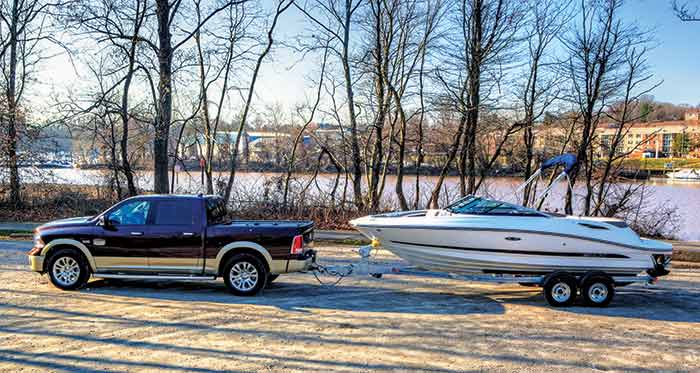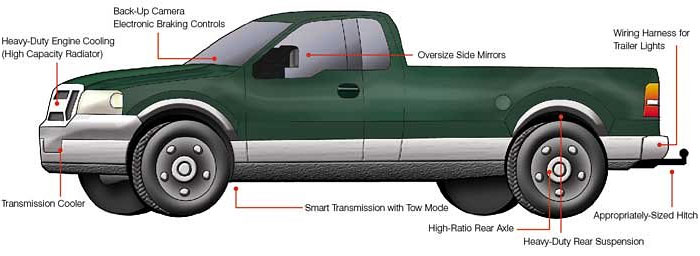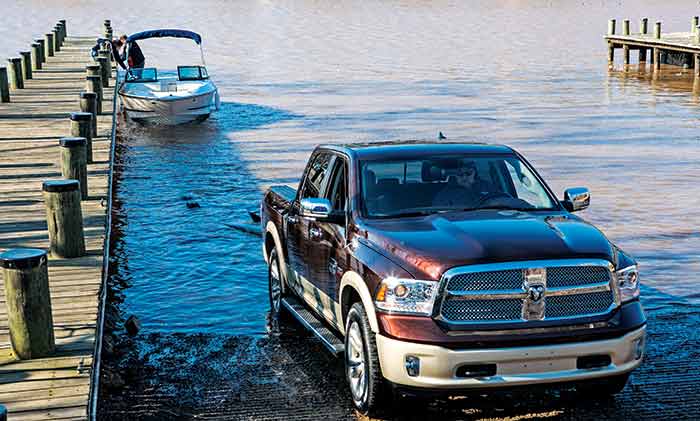Advertisement
Many of us will be using our old reliable vehicle to tow, but if you're thinking of buying new, you might want to consider a factory tow package.

There are several very strong reasons to consider a factory tow package, as opposed to buying the vehicle without any towing equipment and having a local hitch and trailer shop install it. First, the engineers who design the vehicle — from the first drawing to the last manufactured part — work together to ensure that towing a trailer is within the vehicle's capabilities. This means they design the engine, transmission, brakes, frame, electrical system, and cooling system to handle the extra weight of the towed load. To accomplish this, they have to think about and then incorporate the necessary equipment during the development of the vehicle.
Towing By Design
That means including a hitch platform, trailer towing wiring harness, engine cooling capability, transmission cooling capability, and sturdy frame for mounting the hitch. In addition, in many cases, factory designers add or upgrade such things as the rear-end (differential) gearing to make towing less stressful on the engine and transmission. They also upgrade the battery, alternator, and charging system wiring to handle the added electrical load of the trailer's lights.
Towing-capable circuitry is added to the vehicle's onboard ECM (electronic control module, a fancy way of describing the vehicle's computer) so adding trailer lights doesn't harm the electrical wiring and connectors. And finally, they often upgrade the standard shocks/struts and brakes to handle the added load and stress of towing. That's a lot of designing and upgrading! While it may sound very convincing, it's important to remember that not all vehicle tow packages come with all those upgrades. Some come with a portion, some simply include a hitch and trailer wiring package. However, most original equipment (OE) tow packages include some or all of the aforementioned upgrades.
Tow/Haul Defined
"Tow/Haul" mode is a switch that's activated to keep the vehicle's transmission from upshifting into overdrive when towing or carrying a load, so as not to lug the engine with a higher gear. It also prevents the transmission from "hunting" between higher gears while trailering. It's typically available on most full-size trucks and SUVs and is useful when towing up and down hills.
Not For Everyone
Not all trailer towing activities will require all these upgrades and designed-in capabilities. For example, imagine buying a BMW X5 to tow jet skis on a lightweight trailer. That whole GTW (Gross Trailer Weight) might tip the scales at perhaps 2,000 pounds or so. That hardly qualifies as heavy-duty towing, so an aftermarket hitch would likely do just fine — and the added weight of the two skis and trailer would barely register on the Beemer's braking, cooling, and electrical systems. However, if you bought that same X5 with towing a 24-foot cuddy fisherman in mind, one that weighs 5,500 pounds without gas and gear, you can see where having the factory package — engineered and designed to help the vehicle tow heavier loads with less strain — would be the better option.
Know What's Included
The cost of a factory tow package used to be exorbitant compared to an aftermarket hitch. Today, the packages are much more competitive, especially considering all that's included. Carefully read the invoice, window sticker, and manufacturer's web pages to be sure of all that's included in the tow package for the vehicle you're considering.
Aftermarket Options
With all the indicators leading toward selecting a vehicle equipped with a factory tow package, what are the pros and cons of aftermarket products? To start, there's nothing wrong with aftermarket hitches and wiring packages. In fact, there are instances (quite a few, actually) where owners of vehicles with factory hitches have had them removed, and an aftermarket hitch installed. This was more common a few years ago, when aftermarket hitches were generally rated to tow heavier loads than OE hitches. That's not the case today; over the past few years, the OE manufacturers have caught up with aftermarket products in most applications, and now you can buy a truck or SUV with a factory hitch that's rated competitively against aftermarket hitches.

The only case where aftermarket capabilities still trump those of OE is in the extreme, heavy-duty truck arena, where aftermarket manufacturers like Draw-Tite, Reese, and Curt build huge receiver hitches that handle upward of 16,000 pounds Gross Trailer Weight (GTW). Reese's Titan receiver handles 18,000 pounds GTW, with 2,000 pounds tongue weight (TW). On a Dodge Ram 2500 pickup, for example, that's a huge leap over the factory's rating, which is around 12,400 pounds, depending on drivetrain and model.
Tip
Most vehicles' tow-mode option automatically disengages when you turn the engine off, so make sure you reengage the tow/haul function after you stop for food or fuel.
This begs the question: If the factory only rates the vehicle to tow 12,400 pounds, why does the aftermarket build and rate a hitch for so much more? The answer is that the market demands it; if the builder can design a hitch, test it, and rate it at that level, they'll do so. The bottom line, however, is that any vehicle is only safely rated to tow at the lower of the hitch's and overall vehicle's rating. If your SUV is rated to tow 3,500 pounds, and your hitch says 2,000, you should only be towing 2,000.
Paying Up Front?

As a parting thought, it's important to remember that duplicating the OE towing package with aftermarket components is usually next to impossible. While the aftermarket hitch and wiring are comparable, even sometimes better, it would be cost prohibitive to go to the aftermarket and try to retrofit and upgrade the alternator, battery, shocks, brakes, and other components that are typically included in the OE tow package.
Bottom line? If your vehicle choice has a factory tow package option, evaluate it carefully for value — and ensure that it meets your needs. Chances are high it will be your best bet. The cost gets spread out in the monthly payments, too. That means you won't have to come up with another $400 or so at the aftermarket hitch shop, right after you blew the big coin on the vehicle down payment.
